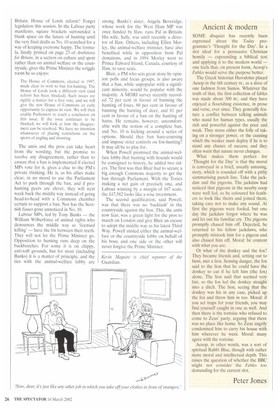Ancient & modern
SOME disquiet has recently been expressed about the Today programme's 'Thought for the Day'. In a slot ideal for a persuasive Christian homily — expounding a biblical text and applying it to the modern world — one feels that, on present form, Aesop's Fables would serve the purpose better.
The Greek historian Herodotus placed Aesop in the 6th century BC, as a slave of one ladmon from Samos. Whatever the truth of that, the first collection of fables was made about 300 BC, and they have enjoyed a flourishing existence, in prose and verse, ever since. They generally feature a conflict between talking animals who stand for human types, usually the rich and powerful against the poor and weak. They stress either the folly of taking on a stronger power, or the cunning which the weaker must deploy if he is to stand any chance of success; and they often warn that nature never changes.
What makes them perfect for 'Thought for the Day' is that the moral is conveyed in a brief, usually amusing, story, which is rounded off with a pithy summarising punch line. Take the jackdaw and the pigeons. The jackdaw had noticed that pigeons in the nearby coop were well fed, so he coloured his feathers to look like theirs and joined them, taking care not to make any sound. At first the pigeons were fooled, but one day the jackdaw forgot where he was and let out his familiar cry. The pigeons promptly chased him off. Dejected, he returned to his fellow jackdaws, who promptly mistook him for a pigeon and also chased him off. Moral: be content with what you are.
Or what of the donkey and the fox? They became friends and, setting out to hunt, met a lion. Sensing danger, the fox said to the lion that he could have the donkey to eat if he left him (the fox) alone. The lion said that seemed very fair, so the fox led the donkey straight into a ditch. The lion, seeing that the donkey was his in any case, picked up the fox and threw him in too. Moral: if you set traps for your friends, you may find yourself caught in one as well. And then there is the tortoise who refused to come to Zeus' party, arguing that there was no place like home. So Zeus angrily condemned him to carry his house with him wherever he went. Moral: many agree with the tortoise.
Aesop, in other words, was a sort of spiritual Rabbi Blue, though with rather more moral and intellectual depth. This raises the question of whether the BBC might not consider the Fables too demanding for the current slot.
Peter Jones
















































































 Previous page
Previous page